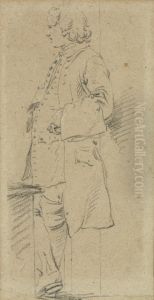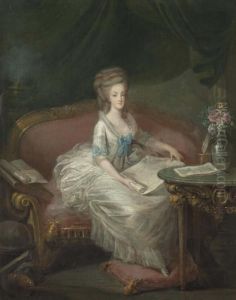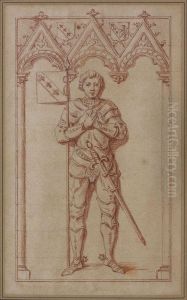Charles Nicolas Cochin Le Jeune Paintings
Charles Nicolas Cochin le Jeune, born on February 22, 1715, in Paris, France, was a distinguished French engraver, designer, writer, and art critic, playing a significant role in the French art scene of the 18th century. He was the son of Charles-Nicolas Cochin le Père, a notable engraver, which positioned him in an environment rich with artistic influence from an early age. Cochin displayed remarkable talent early in life, and his upbringing amidst the thriving artistic community of Paris provided him with the perfect backdrop to hone his skills.
Cochin's work and influence extended beyond his engravings; he was deeply involved in the intellectual and cultural movements of his time. He became a member of the Royal Academy of Painting and Sculpture in 1751, and his role as a designer and art critic further cemented his status in French art history. Cochin was also appointed as a designer for the king's chamber and cabinet in 1757, which gave him the opportunity to contribute significantly to the decoration of royal residences, including Versailles. His involvement in the organization of the Fêtes and ceremonies of the French court highlighted his versatility and his ability to blend artistic skill with the ceremonial needs of the French monarchy.
Throughout his career, Cochin was an advocate for the French Rococo style, though he later championed the early neoclassical movement, reflecting the shifts in artistic tastes of the period. His engravings and writings provide valuable insights into the art and culture of 18th-century France, including his observations on the Salon, the official art exhibition of the Académie des Beaux-Arts in Paris. Cochin's legacy is not only in his artwork but also in his contributions to the promotion and understanding of art during his lifetime.
He was a frequent traveler, his journeys taking him to Italy among other places, where he studied the masterpieces of the Renaissance and antiquity, enriching his artistic vocabulary and approach. Cochin's travel sketches and letters also contribute to our understanding of 18th-century European art and society. His critical essays and reflections on art were influential in shaping the tastes and opinions of the Parisian art world.
Charles Nicolas Cochin le Jeune passed away on April 29, 1790, in Paris. His extensive body of work, including his engravings, designs, and writings, continues to be studied for their artistic merit and for the light they shed on the cultural and societal norms of his time. Cochin remains a pivotal figure in the study of French art history, embodying the intellectual and artistic fervor of the Enlightenment era.


